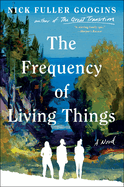
Leo Tolstoy may be right about unhappy families, but The Frequency of Living Things by Nick Fuller Googins (The Great Transition) proves that some pains are universal, even if the details vary. Those who have watched a loved one flail inside addiction may have certain things in common, and the Tayloe sisters are like any other hurting family, despite the fame that followed their band Jojo and the Twins' hit single, "American Mosh." Identical twins Ara and Emma are the talent; younger sister Josie, a scientist, manages everything else--except Ara's substance abuse disorder. After she relapses and ends up in prison, Ara is wracked with shame, but Janice, the "Queen Bee" of their unit at the Massachusetts Correctional Institution, reminds her: "Family will amaze you with how deeply they can forgive. You just have to let them."
Missing from this equation is Bertie, their mother. A disbarred lawyer and lifelong activist, Bertie has been more absent than present in her daughters' lives. Despite that, Bertie is a vital force, the hub around which the whole novel spins. The women imprisoned in MCI-Bogastow know the ferocity of a mother's love: "Lots of women miss sex, dope, music, internet, floss, cigarettes, but there's exactly one thing that unites almost everyone, and that's what they'd do to see their babies." Although she seems indifferent, Bertie knows that ferocity, too, as she tries whatever she can to save her daughter. The Frequency of Living Things is a heartbreaking novel, full of unhappiness, but it also offers some comfort in the assurance that damaging cycles might be broken, and forgiveness is always possible. --Sara Beth West, freelance reviewer and librarian

